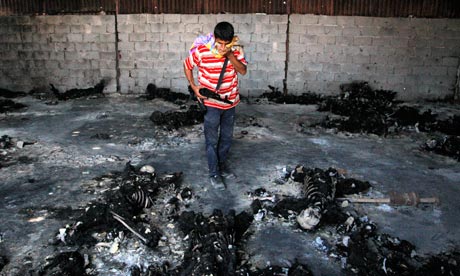Libya: the toll Nato didn't count
The justification for the bombing of Libya was to protect civilians. So why aren't casualties recorded?
A rebel fighter walks inside a warehouse containing the remains of at least 50 burned bodies in Tripoli, LIbya. A survivor said they were civilians killed by pro-Gaddafi soldiers. Photograph: Sergey Ponomarev/AP
No one deserves to die without their death being recorded. Except, it seems, when they are the "collateral damage" of military interventions to "protect" them. Answering a parliamentary question on civilian casualties immediately before the invasion of Iraq, Tony Blair said that Saddam Hussein "will be responsible for many, many more deaths even in one year than we will be in any conflict". Such an off-hand, fact-free, yet essentially quantitative statement would never have gone unchallenged if it had concerned, say, taxation.
Blair's prediction may have been wishful thinking, but he did at least address the matter. Eight years on, Nato intervention in Libya holds itself to no standard of measurement at all.
Obtaining accurate figures is even more vital in the case of Libya, where the declared purpose of military intervention was to protect civilians. In Libya, an immediate note of caution was sounded by the UN's humanitarian affairs and emergency relief coordinator, Valerie Amos, who called on all parties to spare civilians from the effects of hostilities, which "includes refraining from the use of explosive weapons in populated areas".
This is an understandable response: it is reasonable enough to anticipate saving lives when your weapons are medicines, food and shelter, but this was effectively a declaration of war and those are not the weapons of Nato. Whereas potentially life-saving drugs have their side-effects scrupulously studied, there was no indication that the full human consequences of intervention would be examined by any of the parties so vigorously undertaking it.
It is never easy to arrive at an early and reliable figure for deaths in armed conflict – all the more so when the media have restricted access, and official recording capacity is in disarray or itself suppressed. Iraq Body Count (IBC) is a member of a newly-formed international network of organisations (currently 29) who record the victims of armed conflict, each by the best means they can. All are forced to make the most of very limited means, with media reports often treated as a main source or as a lead to later, on-the-ground investigations. The number of reported civilian deaths from post-invasion violence in the IBC database now exceeds 110,000 – a number that continuing analysis of the Iraq War Logs published by WikiLeaks will probably raise by 15,000. These logs revealed that governments can and do collect data on the deaths of "local nationals" – the Pentagon just didn't publish it, except in infrequent and barely penetrable aggregate trend-line figures.
For Libya, recording did briefly take on an official and international character, but this came to an abrupt end on 4 June, with the closure of the UN Office for the Coordination of Humanitarian Affairs-funded Libya crisis map, tracking security incidents across the country. This means there is now no high-profile international project dedicated to recording deaths in the Libya conflict, although there are certainly some dedicated volunteers contributing to the Wikipedia page on the subject which is forced – at present – to hedge its bets with a figure of 2,000 to 13,000 overall deaths across different timeframes.
As with Iraq, government data on casualties remains undisclosed – and, judging by the regular press releases from Britain's defence ministry, Nato planes only ever destroy military facilities and equipment, with nary a soul anywhere near or within them. In April, 14 NGOs involved in monitoring human rights and armed violence wrote to the UN security council, the Arab League and others, urging all parties to the conflict in Libya to commit to record and report on civilian casualties. Only in this way, we argued, could the outcome of the intervention be judged in its own terms of "protecting civilians".
The reply we received from under-secretary Alistair Burt at the Foreign Office had some good in it, including a commitment that "[any] reports that civilians have died as a result of Nato airstrikes will be carefully investigated". But this falls far short of investigating the full human consequences of the conflict, which would require inquiring into all deaths, caused by all parties.
One can usually expect parties in armed conflict to highlight, often in gruesome detail, deaths caused by the opposing side. But that is hardly enough, as illustrated by the reports of African migrants being targetedin Libya in revenge killings as suspected Gaddafi loyalists. In any event, sole focus on deaths for which there is a clear and identifiable link to a particular perpetrator leaves a lot of casualties unrecorded, unidentified, and unacknowledged.
This fails to do justice to the victims or to the truth; it only adds to the agony of the bereaved and leaves all of us understanding less about armed violence than we need to. We should be trying to record all the dead – no excuses.


No comments:
Post a Comment